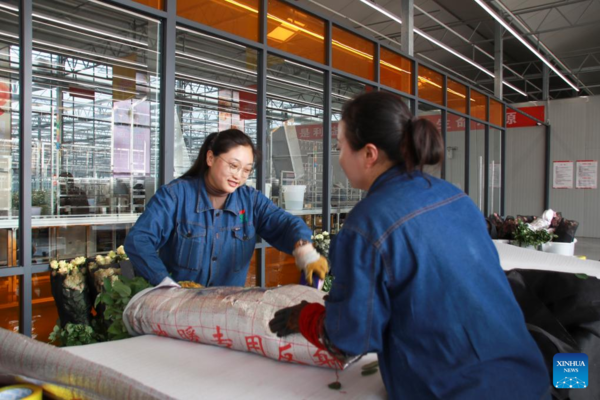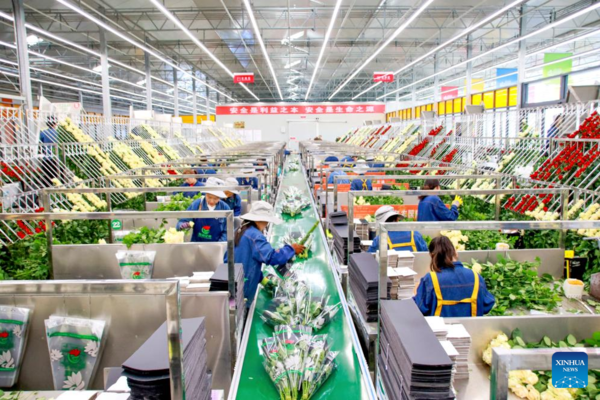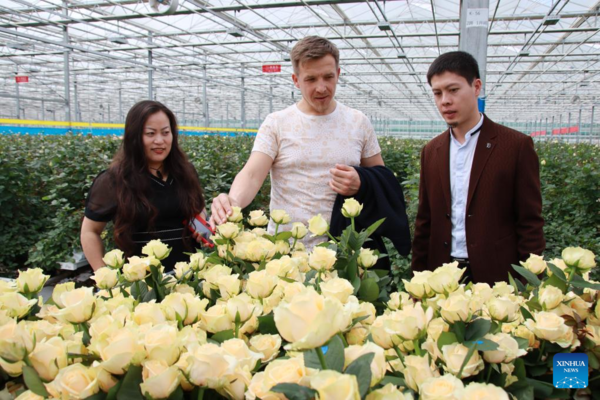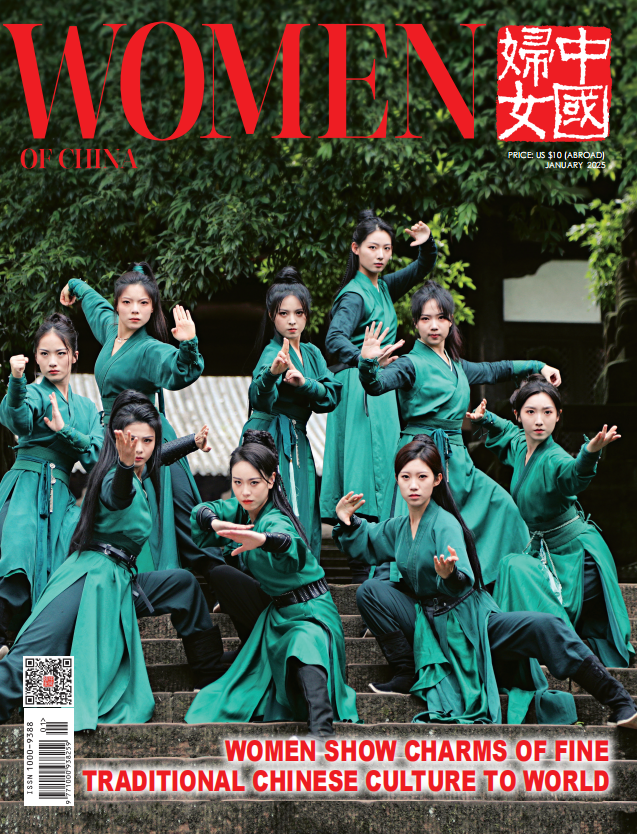Smell of Success for Small-Town Rose Exporter
 |
| This photo taken on Oct. 26, 2023 shows Xu Shuqin (L) packing roses with her colleague at a flower factory of a Flower Port project of Linxia Yinong Agriculture and Animal Husbandry Investment Co., Ltd. in Linxia Hui Autonomous Prefecture, northwest China's Gansu Province. [Xinhua] |
LANZHOU, Oct. 31 (Xinhua) — Amidst the cool autumn air, tens of thousands of roses are in full bloom at an automated smart greenhouse located in Fuhan Township, northwest China's Gansu Province.
The greenhouse is one of three such facilities of a Flower Port project of Linxia Yinong Agriculture and Animal Husbandry Investment Co., Ltd., covering a total area of about 200,000 square meters in Linxia Hui Autonomous Prefecture. The project launched operations in October last year and has cultivated around 1.5 million rose seedlings so far.
Thanks to modern agricultural technologies, such as an automatic temperature and humidity control system, and an integrated smart irrigation and fertilization system, this facility is capable of producing around 200,000 fresh-cut roses daily, earning the name "rose gigafactory" among the local community.
With an average elevation of 2,000 meters and abundant sunlight in a dry climate, the prefecture has become an excellent location for rose cultivation. In Fuhan Township, home to approximately 40,000 residents, the rose industry has enabled many local farmers to become industrial workers.
The company's Flower Port project has now offered more than 500 employment opportunities for the locals, and Xu Shuqin is one of them. The daily work of the production-line worker involves delicately placing thornless roses into paper boxes.
"There has been a surge in rose orders recently, and I need to package more than 4,000 fresh flowers every day," said the 32-year-old woman, who often wears headphones and listens to popular songs while working.
Xu is satisfied with her job at the company. The average annual salary for the workers there is 45,000 yuan (about 6,276 U.S. dollars), a substantial improvement on the incomes in traditional farming.
Just recently, a batch of fresh-cut roses packaged by Xu and her colleagues was shipped to Moscow, where they were sold in the local flower markets.
With over a decade in the flower trade, Russian businessman Ageev Rinad has visited the company's Flower Port three times. In mid-October this year, his company ordered 200,000 fresh-cut roses that were dispatched from Linxia. The flowers were transported via a cold-chain truck, passing through the Alataw Pass in the northwestern Xinjiang Uygur Autonomous Region before entering Kazakhstan, and finally reaching Moscow.
"It was the first time we'd used overland transportation to bring fresh-cut roses from Linxia to a city in Russia," he said. "The customs and trade departments in Gansu worked tirelessly to assist us in the customs clearance process. I really appreciated that."
In August this year, the Chinese company also transported some of its flowers to Kazakhstan, a significant breakthrough for local flower and plant exports.
In addition, two flower companies in the prefecture have seen their products exported to Japan, the Republic of Korea and Singapore, reflecting a growing international demand for their blooms.
 |
| This photo taken on Aug. 15, 2023 shows workers packing roses at a flower factory of a Flower Port project of Linxia Yinong Agriculture and Animal Husbandry Investment Co., Ltd. in Linxia Hui Autonomous Prefecture, northwest China's Gansu Province. [Xinhua] |
 |
| This photo taken on Sept. 28, 2023 shows Russian businessman Ageev Rinad (C) visiting a Flower Port project of Linxia Yinong Agriculture and Animal Husbandry Investment Co., Ltd. in Linxia Hui Autonomous Prefecture, northwest China's Gansu Province. [Xinhua] |
(Source: Xinhua)
Please understand that womenofchina.cn,a non-profit, information-communication website, cannot reach every writer before using articles and images. For copyright issues, please contact us by emailing: website@womenofchina.cn. The articles published and opinions expressed on this website represent the opinions of writers and are not necessarily shared by womenofchina.cn.






.jpg)

 WeChat
WeChat Weibo
Weibo 京公网安备 11010102004314号
京公网安备 11010102004314号